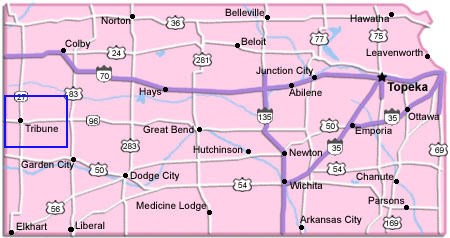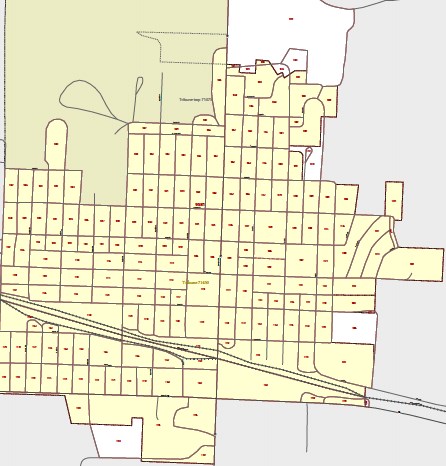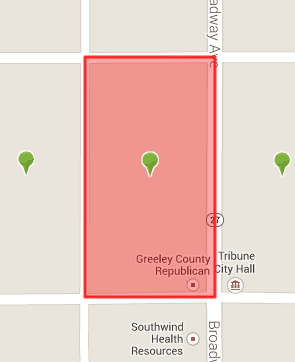
Klink
Rep. Ron Klink represented the citizens of Pennsylvania’s 4th Congressional District for most of the 1990s, but today he represents the interests of Comcast — but one would never know it from his website’s client list.
Klink was a popular moderate Democrat in his far western-central district north of Pittsburgh. But that was not enough to challenge then-Sen. Rick Santorum in 2000 for a Senate seat. Klink was a virtual unknown in the heavily populated eastern part of the state and lost the race by five points.
Klink did not stay disappointed for long after the election, following many other ex-members of Congress through Washington’s revolving door, coming out on the other side as a professional lobbyist.
Ron Klink & Associates tells its clients, “the key to success… is access.”
“At Ron Klink and Associates, we pride ourselves on having the expertise and experience to navigate our clients through the political and bureaucratic mazes of government at the federal, state and local levels,” says Klink’s website. “It is often the case that organizations involved in issues of the day have the most difficulty reaching the branches of government needed to state their case. Whether on Capitol Hill in Washington, D.C., at federal agencies, or at any State Capitol, we guide our clients to interact effectively with decision makers in order to advance each client’s agenda.”
Klink specializes in getting clients face time with elected officials — access ordinary citizens are unlikely to have. When members of Congress ponder policy changes, many rely heavily on the advice that reaches them during these meetings. Knowing how to get a personal sit down with a member of Congress or senator can make all the difference. Fact-finding hearings are also critical in the persuasion game, and Klink’s firm makes sure clients win access to the precious few seats at the testimony table:
Ron Klink and Associates provides clients with the opportunity to influence the decisions made in the halls of Congress, federal agencies and the White House. We have extensive experience in issues analysis that can be helpful to a client trying to anticipate policy changes in the government. Ron Klink and Associates will work with the client to develop and then successfully implement a strategy that yields desired results. Our extensive contacts on Capitol Hill and the Executive Branch, allow our clients’ issues, whether legislative or regulatory, to be heard by key decision makers, thus giving a competitive advantage to the client.
Direct lobbying is only part of our government relations service. With more that 2,500 pieces of legislation being considered annually by the Congress, it is difficult for companies to follow legislation important to their industries. Ron Klink and Associates provides daily monitoring of all legislation, committee hearings, proposed rules, media events, news reports and behind the scenes discussions pertinent to the client’s success. Ron Klink and Associates will report daily if necessary on any events of importance to the client.
We also arrange for our clients to testify before Congress or a federal agency hearing when deemed helpful. We draft the testimony for the client, the media advisory and eventual press release explaining the significance of the event. We provide the panel Members with information about the clients and their interests, as well as conduct all follow up that may be needed to obtain a successful result.
We have arranged seminars and briefings for Members of Congress and Executive Branch employees in order to educate them on the importance of client issues. From these seminars, we are able to build strong, bipartisan coalitions of support to assist us in advancing the client’s goals.
 With thousands of lobbyists providing services similar to ex-Congressman Klink, it should not be surprising ordinary constituents without a team to go to bat on their behalf have a hard time getting a word in.
With thousands of lobbyists providing services similar to ex-Congressman Klink, it should not be surprising ordinary constituents without a team to go to bat on their behalf have a hard time getting a word in.
Most lobbying firms brag about their client list to attract more business. But not Ron Klink. He likes to keep his biggest clients a secret. Among them is a little cable company called Comcast, based in Philadelphia.
Klink doesn’t mention the company at all and does not admit he works on their behalf.
That rubbed the Tribune-Review the wrong way, and the newspaper slapped a “Loser Label” on the ex-politician:
The former congressman seems reluctant to admit he works for a communications conglomerate known for its constantly rising cable rates and less-than-stellar customer service.
The Murrysville Democrat was one of five former congressional members recently identified by The New York Times as being registered Comcast lobbyists. There likely is considerable work ahead for that group, as Comcast seeks federal approval to swallow competitor Time Warner Cable.
Klink’s website, ronklink.com, doesn’t identify Comcast as one of his lobbying clients. But Klink does own up to working for lesser-known entities such as Beaver County and the Findlay Township Municipal Authority.
For being so secretive about his Comcast connection, Klink gets the loser label.
Klink isn’t even close to being the only ex-member of Congress or public official now on Comcast’s payroll. Our favorite at Stop the Cap! remains the completely shameless and transparent Meredith Attwell-Baker, ex-commissioner at the Federal Communications Commission. Just months after voting in favor of the merger of Comcast and NBC, she hurried her resignation letter to FCC chairman Julius Genachowski and took a lucrative job at Comcast’s “government relations” department — a nice turn of phrase that really means “lobbyist.”

Comcast’s lobbying team includes six former government officials. From left, former Senator Don Nickles, former Representative Robert Walker, former Senator Blanche Lincoln, former Representative Ron Klink, David Cohen of Comcast and former F.C.C. member Meredith Attwell Baker.


 Subscribe
Subscribe Should regulators bless the coupling of Comcast and Time Warner Cable, some TWC customers will not be invited to the wedding.
Should regulators bless the coupling of Comcast and Time Warner Cable, some TWC customers will not be invited to the wedding. Netflix has
Netflix has 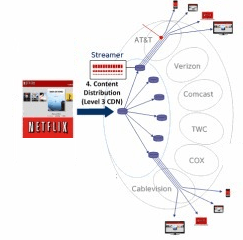 Netflix has traditionally avoided owning the “pipes” that distribute movies and TV shows to paying customers. Instead, it usually contracts with “transit providers” to send content from Netflix headquarters on to “content distribution networks (CDN)” that manage video streaming. A Netflix video may pass through a number of connections on a variety of independently owned networks before it arrives at the front door of your Internet Service Provider. Companies like Comcast handle “the last mile” of the journey that began at Netflix and ends at your computer or television set.
Netflix has traditionally avoided owning the “pipes” that distribute movies and TV shows to paying customers. Instead, it usually contracts with “transit providers” to send content from Netflix headquarters on to “content distribution networks (CDN)” that manage video streaming. A Netflix video may pass through a number of connections on a variety of independently owned networks before it arrives at the front door of your Internet Service Provider. Companies like Comcast handle “the last mile” of the journey that began at Netflix and ends at your computer or television set. Netflix and YouTube together are now estimated to cover 50 percent of all video traffic on the Internet, and that traffic is growing. Cogent dutifully passes that video content along to Internet Service Providers like Verizon and Comcast that have customers waiting to watch. But it is a two-way street. Any outbound traffic from customers could also be forwarded to Cogent to send on. Traditionally, both sides have managed the traffic by gradually increasing the bandwidth and speed of their connections to one-another. But as Netflix traffic grows and grows, companies like Comcast and Verizon believe they are being saddled with the costs to upgrade their networks in ways that are out of proportion to the traffic they send in the other direction. ISPs often grumble about the cost but keep on upgrading to keep paying customers happy. Verizon and Comcast are suspected of dragging their feet on those upgrades in an effort to win compensation.
Netflix and YouTube together are now estimated to cover 50 percent of all video traffic on the Internet, and that traffic is growing. Cogent dutifully passes that video content along to Internet Service Providers like Verizon and Comcast that have customers waiting to watch. But it is a two-way street. Any outbound traffic from customers could also be forwarded to Cogent to send on. Traditionally, both sides have managed the traffic by gradually increasing the bandwidth and speed of their connections to one-another. But as Netflix traffic grows and grows, companies like Comcast and Verizon believe they are being saddled with the costs to upgrade their networks in ways that are out of proportion to the traffic they send in the other direction. ISPs often grumble about the cost but keep on upgrading to keep paying customers happy. Verizon and Comcast are suspected of dragging their feet on those upgrades in an effort to win compensation. But that argument does not explain why Netflix was compelled to make a financial arrangement with Comcast. The two companies have been in negotiations on the subject of traffic compensation for months. Many industry observers believe those talks went nowhere until Netflix customers began complaining about the increasing network slowdowns. Some even dropped their Netflix subscriptions over the issue.
But that argument does not explain why Netflix was compelled to make a financial arrangement with Comcast. The two companies have been in negotiations on the subject of traffic compensation for months. Many industry observers believe those talks went nowhere until Netflix customers began complaining about the increasing network slowdowns. Some even dropped their Netflix subscriptions over the issue.
 Verizon has introduced a two-year price guarantee offer and a free broadband speed upgrade for new customers
Verizon has introduced a two-year price guarantee offer and a free broadband speed upgrade for new customers 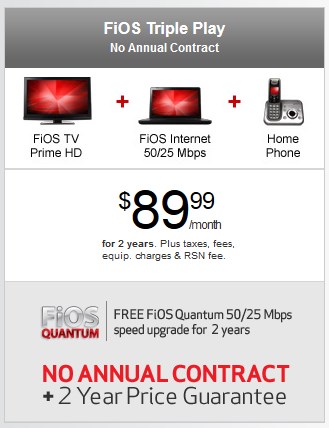 “The current form of competition in this entire sector is essentially focused on promotional pricing, which allows customers who jump from provider to provider to get the best deal,” said Britt.
“The current form of competition in this entire sector is essentially focused on promotional pricing, which allows customers who jump from provider to provider to get the best deal,” said Britt.
